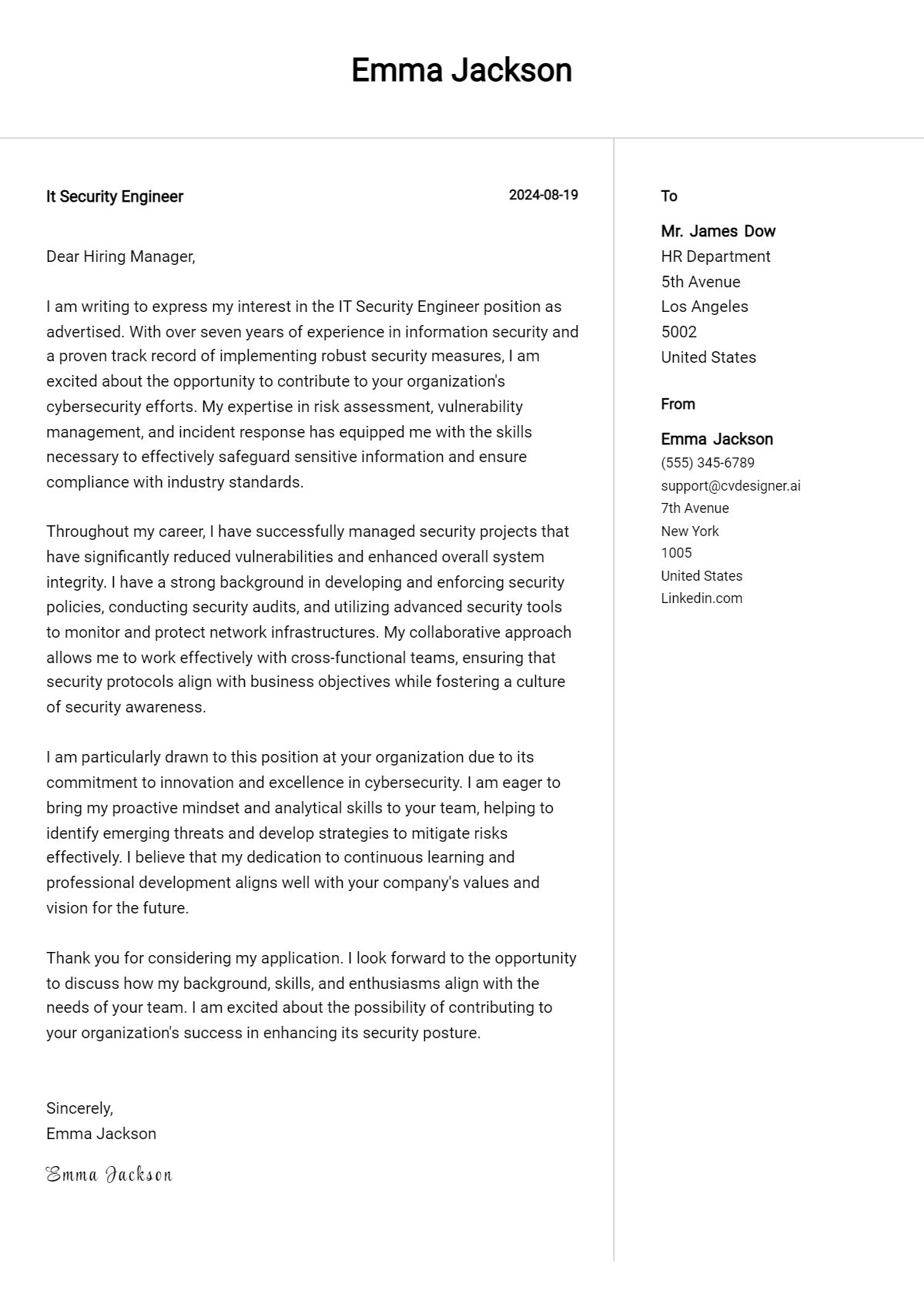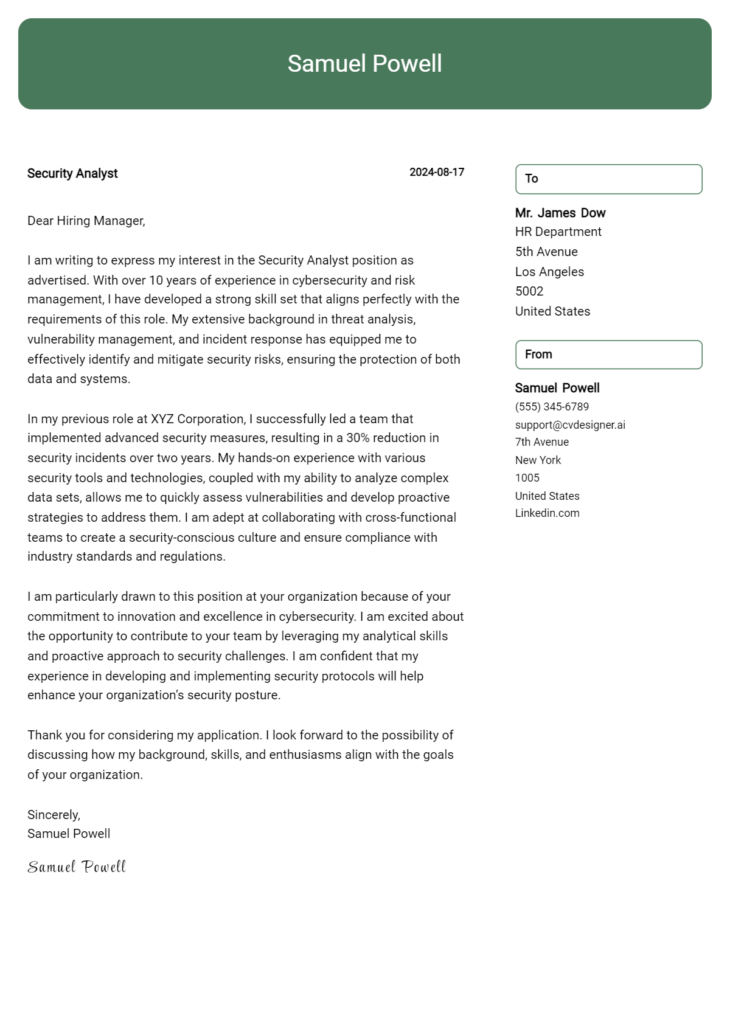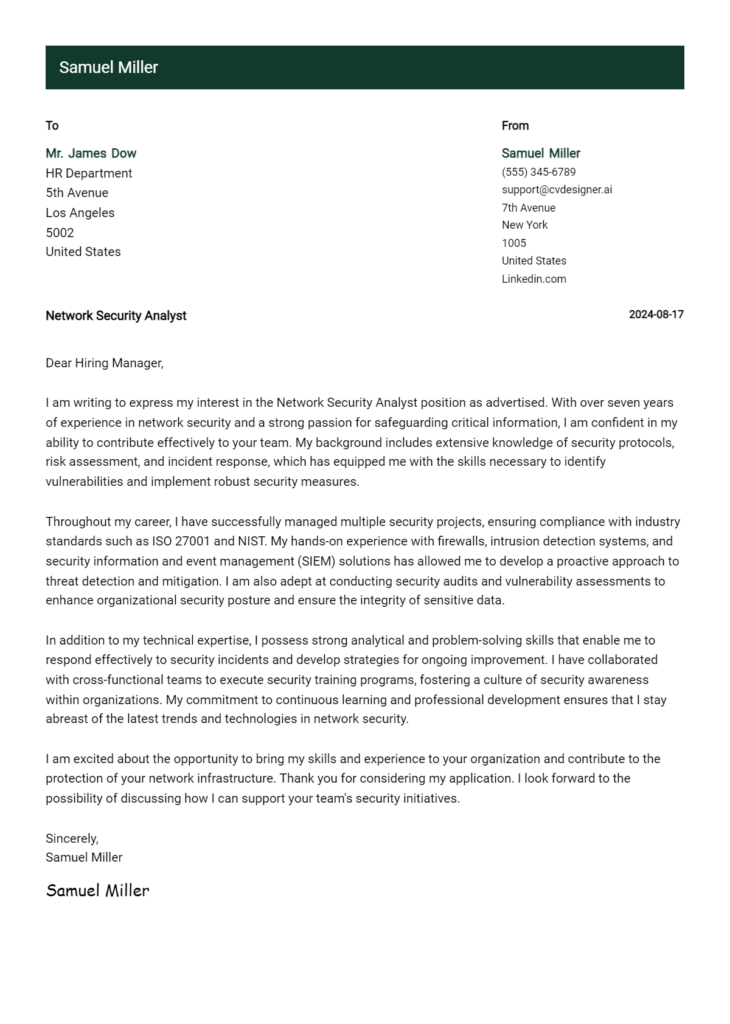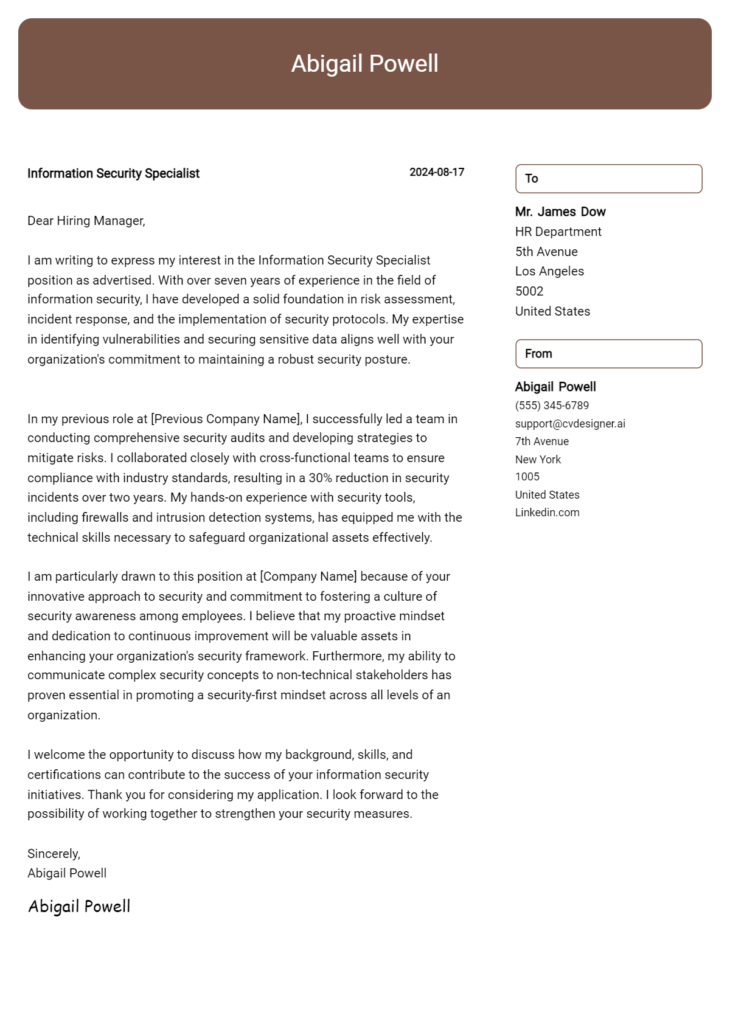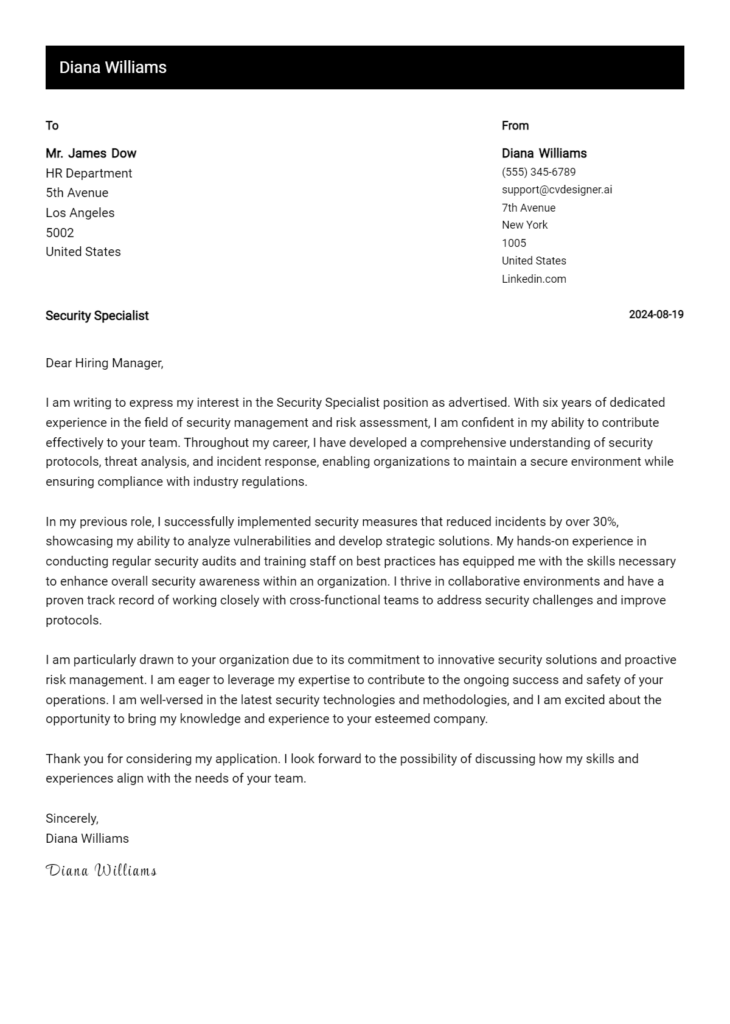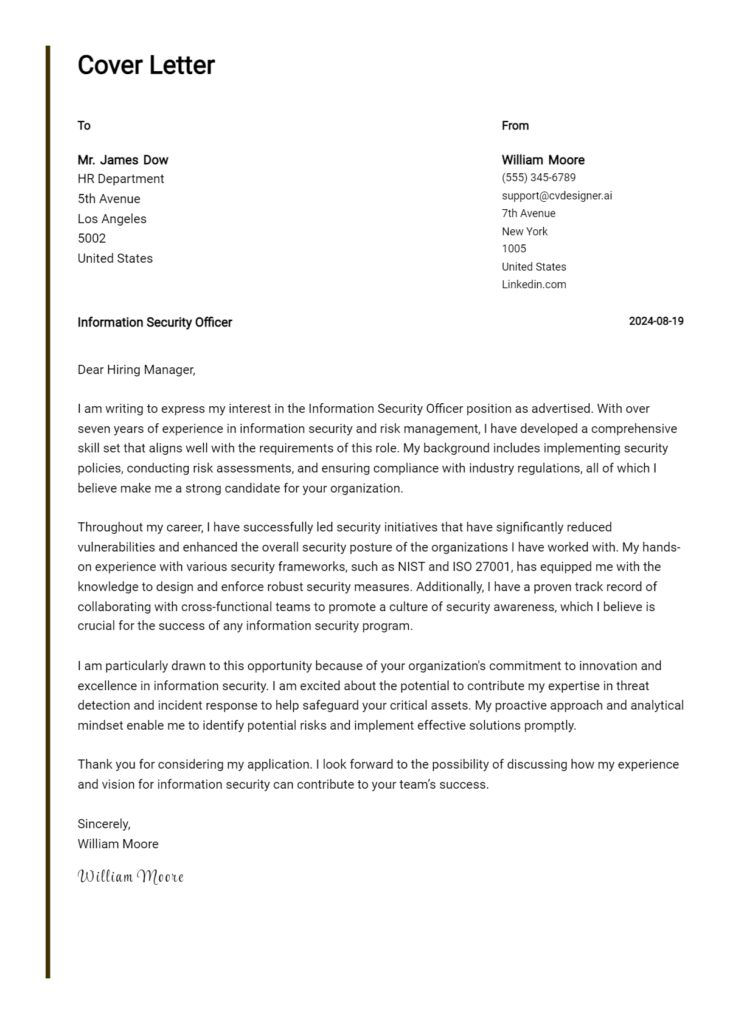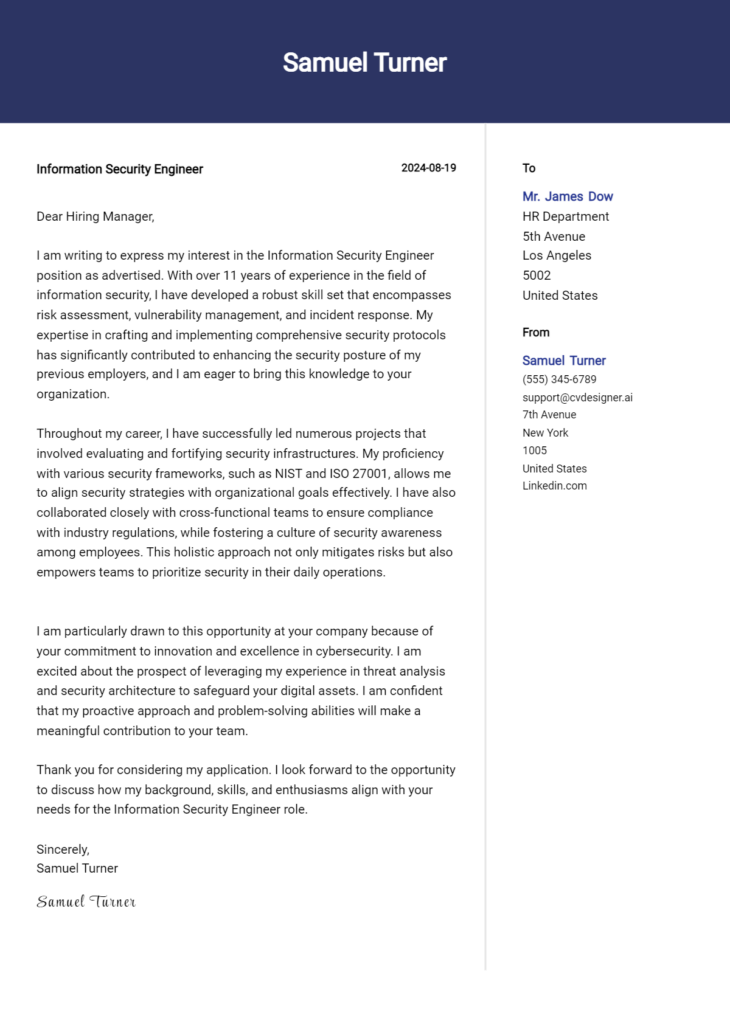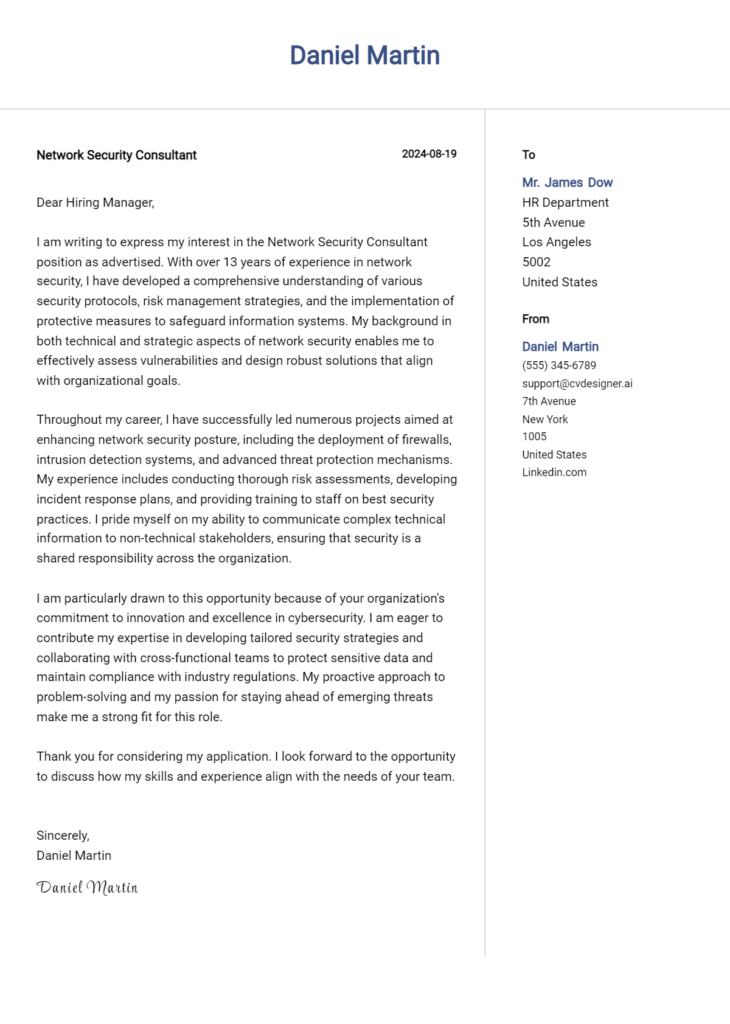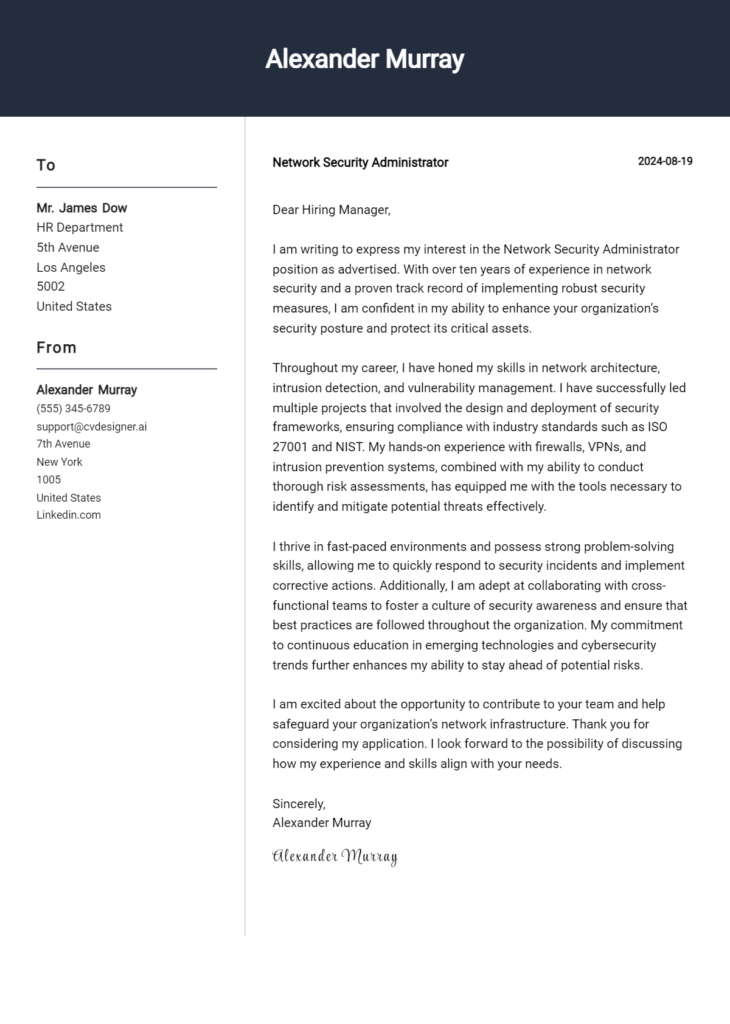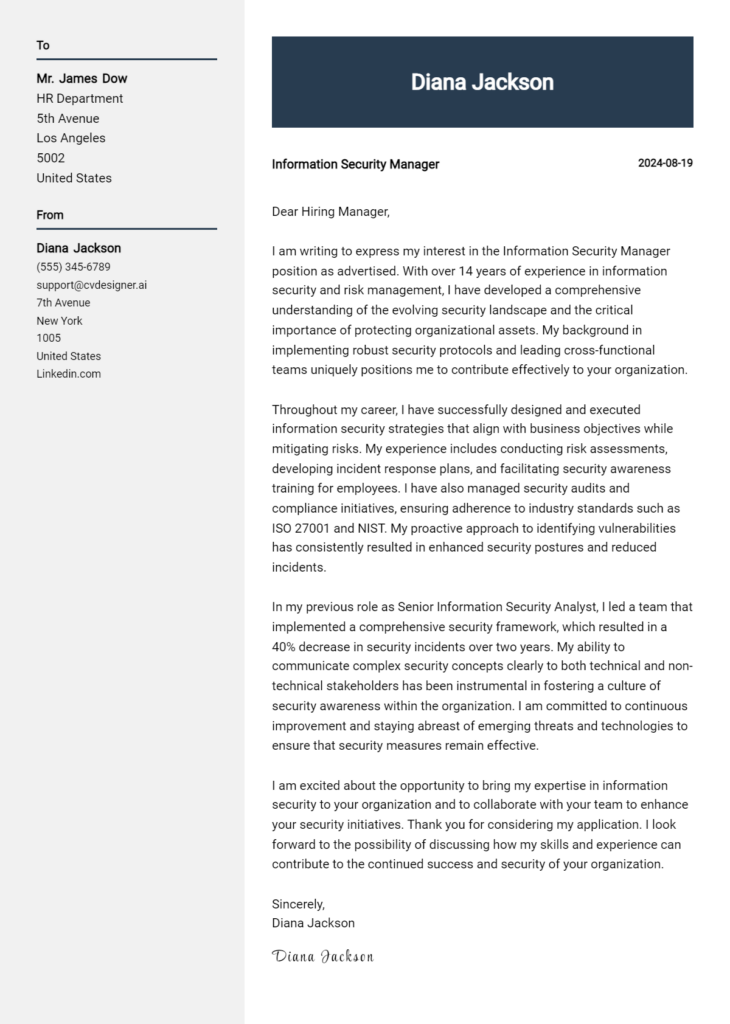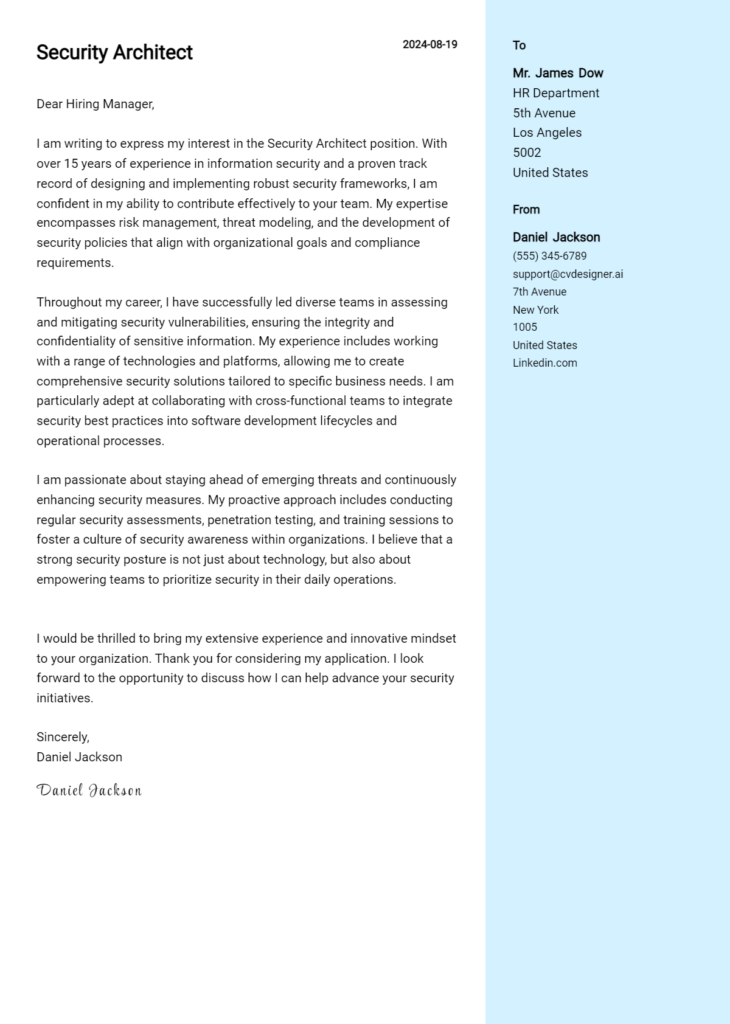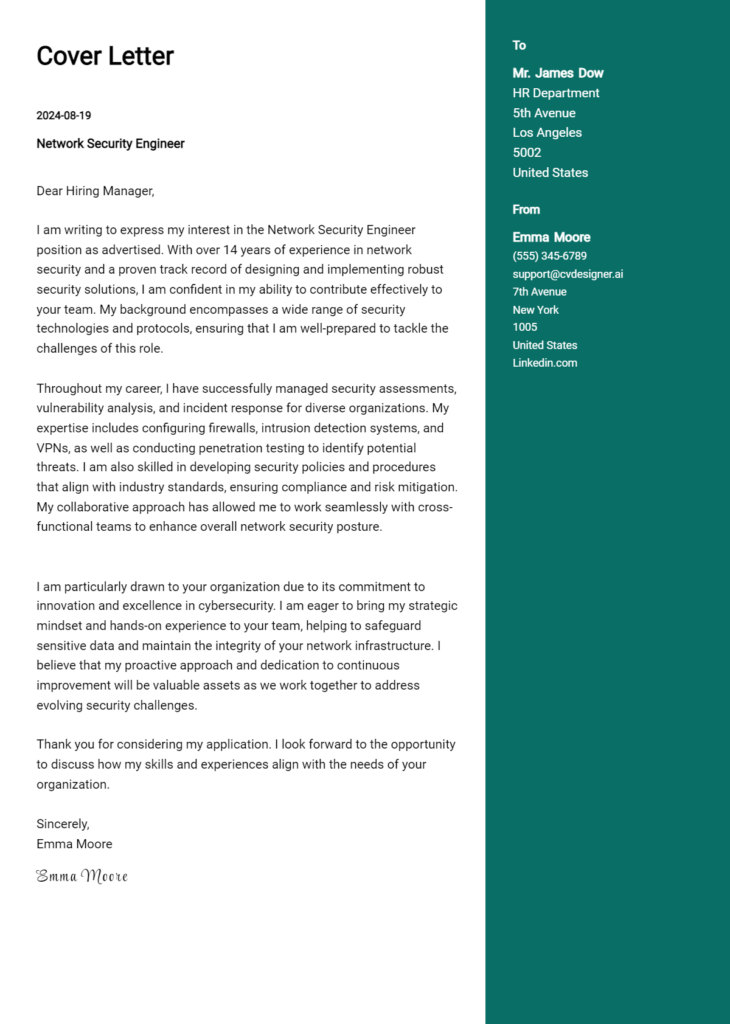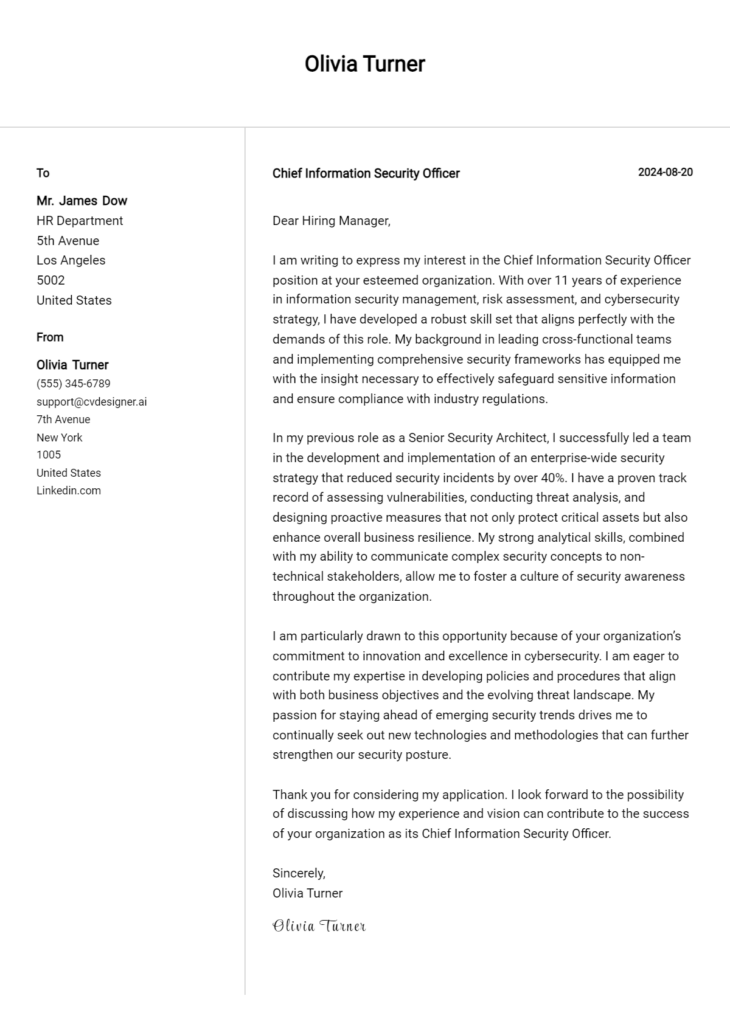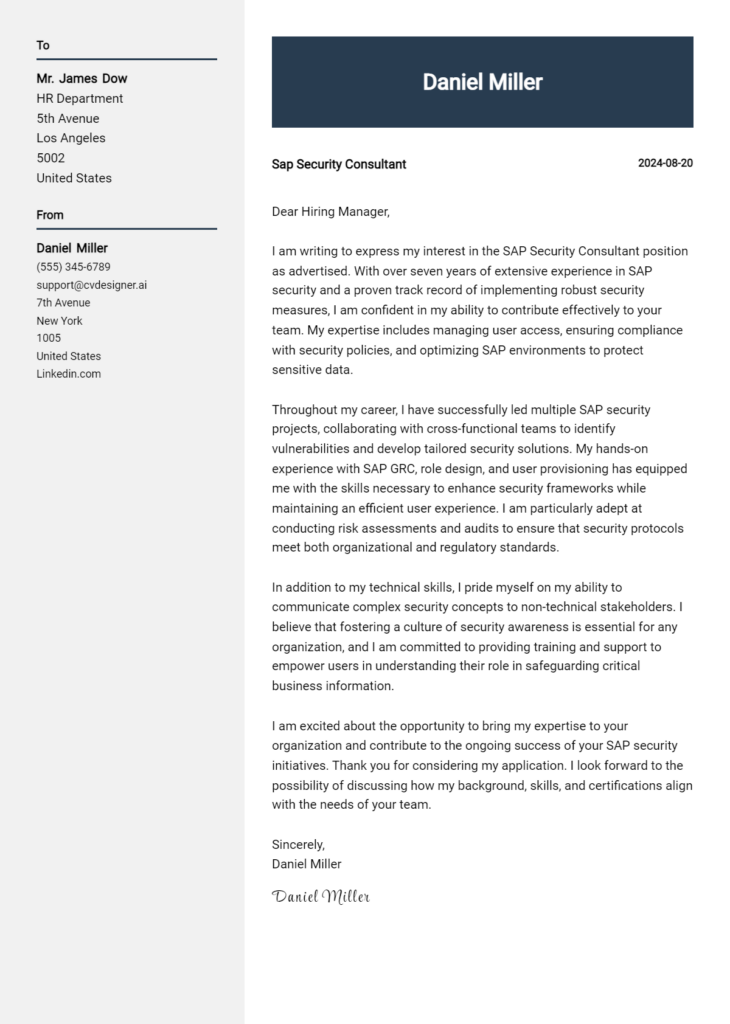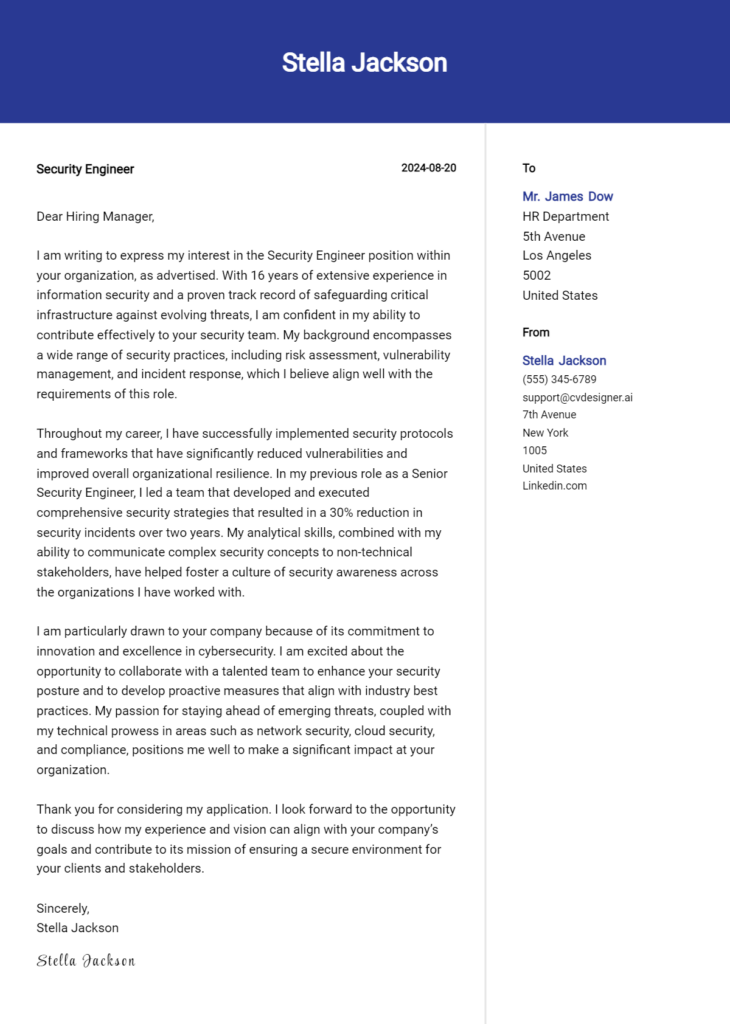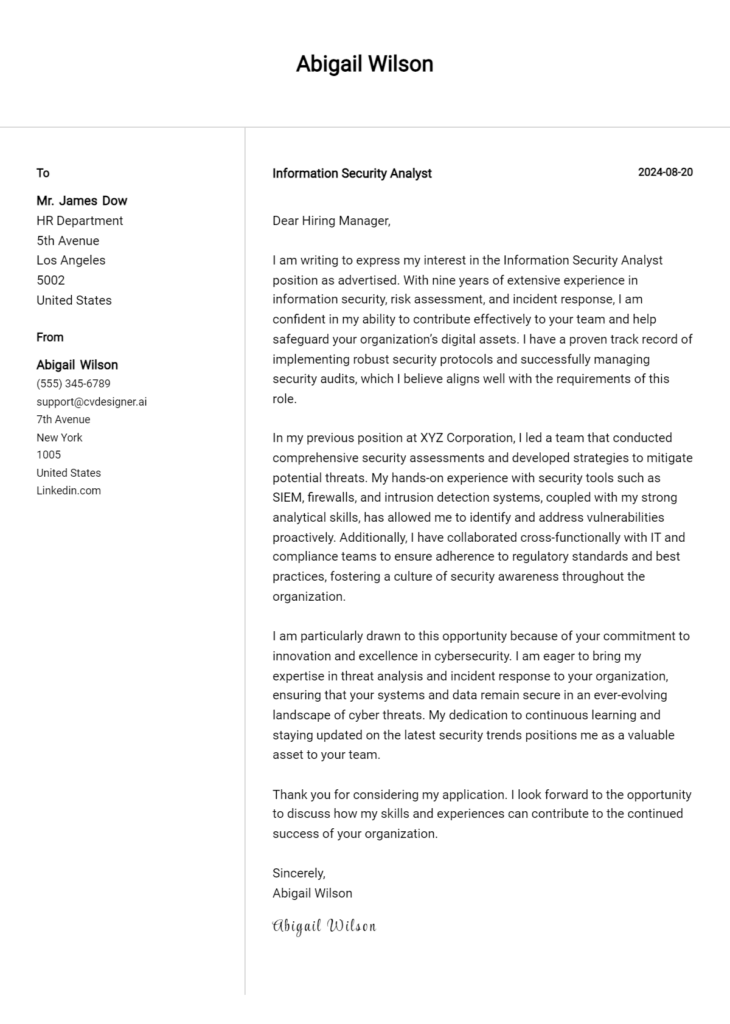Most Popular It Security Engineer Cover Letter Examples
Explore additional It Security Engineer cover letter samples and guides and see what works for your level of experience or role.
Crafting a compelling cover letter is a crucial step in landing a position as an IT Security Engineer, and this guide is designed to equip you with everything you need to create a standout application. A well-written cover letter not only showcases your qualifications but also highlights your passion for cybersecurity and your understanding of the organization's needs. In this article, we will delve into the essential elements that make up an effective IT Security Engineer cover letter, including:
- What does an IT Security Engineer Cover Letter accomplish?
Understand the purpose of your cover letter and how it complements your resume. - Key Components of an IT Security Engineer Cover Letter
Learn the critical elements that should be included to grab the employer’s attention. - Format an IT Security Engineer Cover Letter
Discover the best practices for formatting your letter for maximum professionalism. - Three different level cover letter examples
Explore tailored examples that cater to entry-level, mid-level, and senior-level positions. - Common Mistakes to Avoid in an IT Security Engineer Cover Letter
Identify pitfalls that could undermine your application and learn how to steer clear of them. - Key Takeaways
Summarize the most important points to remember as you craft your cover letter.
By the end of this article, you'll have the insights and tools necessary to write a persuasive cover letter that stands out in the competitive field of IT security. Let's get started!
What does a IT Security Engineer Cover Letter accomplish?
A cover letter for an IT Security Engineer plays a crucial role in showcasing an applicant's technical expertise and passion for safeguarding digital assets. It serves as a personalized introduction that highlights relevant skills, experiences, and achievements while explaining how they align with the organization's security needs. By effectively communicating their understanding of cybersecurity principles and their proactive approach to risk management, candidates can differentiate themselves from others in the competitive job market. Moreover, utilizing resources like a cover letter guide can help applicants craft compelling narratives, while a cover letter builder can streamline the creation process, ensuring that the final product is both professional and tailored to the specific role.
Key Components of a IT Security Engineer Cover Letter
- Introduction and Personalization: Start your cover letter with a strong introduction that includes the job title you're applying for and a brief statement about why you're a great fit for the IT Security Engineer role. Personalize the letter by mentioning the company’s name and any specific projects or values that resonate with you.
- Relevant Experience and Skills: Highlight your professional experience in IT security, focusing on specific skills and achievements that align with the job requirements. Use quantifiable metrics where possible to demonstrate your impact in previous roles. For examples of how to articulate your experience effectively, check out these cover letter examples.
- Technical Proficiencies: Detail your technical expertise related to IT security, such as knowledge of firewalls, intrusion detection systems, encryption protocols, and risk assessment tools. This section should convey your understanding of the tools and technologies essential for the role.
- Closing Statement and Call to Action: Conclude your cover letter with a strong closing statement that reiterates your enthusiasm for the position and your desire to contribute to the company's security initiatives. Encourage the reader to review your resume and express your hope for an interview to discuss your qualifications further. For tips on how to format your cover letter effectively, refer to this guide on cover letter format.
How to Format a IT Security Engineer Cover Letter
As an IT Security Engineer, a well-structured cover letter is essential to highlight your technical skills, experience, and suitability for the role. Here are key points to consider when formatting your cover letter:
- Personalize the Greeting: Address the letter to the hiring manager by name if possible, demonstrating your interest in the specific position.
- Open with a Strong Introduction: Clearly state the position you are applying for and where you found the job listing. Mention your current role or relevant experience briefly to capture attention.
- Highlight Relevant Skills: Focus on key technical skills such as knowledge of firewalls, VPNs, IDS/IPS, encryption technologies, and security protocols.
- Showcase Certifications: Mention any relevant certifications such as CISSP, CISM, CEH, or CompTIA Security+ that validate your expertise in IT security.
- Emphasize Experience: Provide a brief overview of your professional experience, emphasizing roles where you implemented security measures, conducted risk assessments, and managed security incidents.
- Demonstrate Problem-Solving Abilities: Share examples of how you identified vulnerabilities and developed strategies to mitigate risks, showcasing your analytical skills.
- Mention Collaboration: Highlight your ability to work with cross-functional teams to enhance security posture and ensure compliance with regulations.
- Include Continuous Learning: Discuss your commitment to staying updated with the latest security trends and technologies, reflecting your dedication to professional growth.
- Conclude with Enthusiasm: Reiterate your interest in the position and the company, expressing your eagerness to contribute to their security initiatives.
- Professional Closing: Use a formal closing statement, followed by your name and contact information, ensuring it aligns with professional standards.
IT Security Engineer Entry-Level Cover Letter Example #1
I am writing to express my interest in the entry-level IT Security Engineer position at [Company Name], as advertised on [Job Board/Company Website]. With a Bachelor’s degree in Cybersecurity from [University Name] and a strong foundation in network security principles, I am excited about the opportunity to contribute to your team and help safeguard your organization’s digital assets.
During my academic career, I completed several projects that honed my skills in threat analysis and vulnerability assessment. For instance, I led a team project where we simulated various cyberattack scenarios to test the resilience of a network infrastructure. This hands-on experience allowed me to develop my technical skills in using tools such as Wireshark and Nessus, as well as to gain valuable insights into the importance of proactive security measures. Additionally, I interned with [Previous Company Name], where I assisted in monitoring network traffic and identifying potential security breaches. This role not only enhanced my analytical abilities but also taught me the significance of collaboration in a security-focused environment.
Furthermore, I am committed to continuous learning in the ever-evolving field of cybersecurity. I have pursued certifications such as CompTIA Security+ and am currently preparing for Certified Ethical Hacker (CEH) certification. My passion for staying updated with the latest security trends and best practices, combined with my technical skills, positions me well to contribute effectively to your organization.
I am eager to bring my background in cybersecurity and my enthusiasm for IT security to [Company Name]. I believe that my proactive approach and dedication to learning will make me a valuable addition to your team. I look forward to the opportunity to discuss my application further and how I can help enhance the security posture of your organization.
Thank you for considering my application. I hope to speak with you soon.
IT Security Engineer Mid-Level Cover Letter Example #2
I am writing to express my interest in the IT Security Engineer position at [Company Name], as advertised on [Job Board/Company Website]. With over five years of experience in information security, coupled with my commitment to safeguarding sensitive data and systems, I am excited about the opportunity to contribute to your team.
In my previous role at [Previous Company Name], I successfully developed and implemented a comprehensive security framework that reduced potential vulnerabilities by over 30%. I led a cross-functional team to conduct thorough risk assessments and penetration testing, which not only identified key security gaps but also enhanced our incident response protocols. My experience with firewall management, intrusion detection systems, and endpoint security solutions has equipped me with the technical skills necessary to protect organizational assets against evolving cyber threats.
I am particularly skilled in utilizing security information and event management (SIEM) tools, including [specific SIEM tools you have experience with], to analyze security incidents and automate responses. My proactive approach allows me to stay ahead of potential threats while ensuring compliance with industry regulations such as GDPR and HIPAA. Additionally, my collaboration with IT teams to conduct security awareness training has fostered a culture of security consciousness across the organization, significantly reducing the risk of human error-related breaches.
Furthermore, I hold relevant certifications, including Certified Information Systems Security Professional (CISSP) and Certified Ethical Hacker (CEH), which demonstrate my commitment to continuous learning and professional development in the field of IT security. I am passionate about staying up-to-date with the latest security trends and best practices, which I believe will be beneficial in supporting [Company Name]'s mission to maintain a robust security posture.
Thank you for considering my application. I am eager to bring my expertise in IT security to [Company Name] and collaborate with your team to fortify the organization's defenses. I look forward to the opportunity to discuss how my skills and experiences align with your needs.
IT Security Engineer Experienced Cover Letter Example #3
I am excited to apply for the IT Security Engineer position at [Company Name], as advertised on [Job Board/Company Website]. With over [X years] of comprehensive experience in information security and a proven track record of designing, implementing, and managing security protocols for diverse organizations, I am confident in my ability to contribute effectively to your team and enhance your security posture.
In my previous role at [Previous Company Name], I spearheaded the development of a robust security framework that significantly reduced vulnerabilities by [X%]. I led a team in conducting thorough risk assessments and penetration testing, identifying critical weaknesses in our systems, and implementing mitigation strategies that ensured compliance with industry regulations such as GDPR and PCI-DSS. My hands-on expertise with security tools such as [specific tools or technologies] has enabled me to proactively manage threats and protect sensitive data, fostering a culture of security awareness across the organization.
Additionally, my experience in incident response has honed my ability to act swiftly and effectively under pressure. I successfully managed several security incidents, coordinating cross-functional teams to investigate and remediate breaches while minimizing downtime and impact on operations. My ability to communicate complex security concepts to non-technical stakeholders has proven invaluable in ensuring that security policies are understood and adopted at all levels of the organization.
I am particularly drawn to the opportunity at [Company Name] due to [specific reason related to the company or its mission]. I admire your commitment to [specific value or project], and I am eager to contribute my expertise in both proactive security measures and reactive incident response to help [Company Name] achieve its goals.
I look forward to the possibility of discussing how my extensive background in IT security can be an asset to your organization. Thank you for considering my application. I hope to bring my passion for cybersecurity and my dedication to excellence to the talented team at [Company Name].
Cover Letter Tips for IT Security Engineer
When crafting a cover letter for an IT Security Engineer position, it's essential to highlight not only your technical skills but also your understanding of the broader implications of cybersecurity in an organization. Start by addressing the specific requirements outlined in the job description, showcasing your relevant experience and certifications. Use concrete examples to demonstrate how your previous work has contributed to enhancing security protocols, mitigating risks, or responding to incidents. Personalize your letter to reflect the company’s mission and values, making it clear why you're a good fit for their team. A well-structured cover letter that conveys your passion for cybersecurity and your proactive approach to problem-solving can make a significant impact on potential employers.
Cover Letter Tips for IT Security Engineer:
- Tailor Your Letter: Customize your cover letter for each application by referencing specific requirements and projects mentioned in the job description.
- Highlight Relevant Experience: Focus on your hands-on experience with security tools, protocols, and incident response—quantify your achievements where possible.
- Showcase Certifications: Mention relevant certifications, such as CISSP, CEH, or CompTIA Security+, to establish your credibility in the field.
- Emphasize Problem-Solving Skills: Provide examples of challenges you've faced in previous roles and how you successfully addressed them.
- Convey Passion for Cybersecurity: Share a brief anecdote or explanation of why cybersecurity is important to you, showcasing your commitment to the field.
- Use Technical Language Wisely: While it’s important to demonstrate your technical expertise, avoid excessive jargon that may alienate non-technical readers.
- Demonstrate Teamwork and Communication: Highlight your ability to collaborate with cross-functional teams and communicate complex security concepts to non-technical staff.
- Proofread for Accuracy: Ensure your cover letter is free from grammatical errors and typos, which can undermine your professionalism and attention to detail.
How to Start a IT Security Engineer Cover Letter
As you embark on crafting your cover letter for an IT Security Engineer position, it's crucial to make a strong first impression. The introduction sets the tone for the rest of your letter and should highlight your enthusiasm for the role while briefly mentioning your relevant skills and experiences. Here are some effective examples of introductory paragraphs for your cover letter:
“With a robust background in cybersecurity and a passion for protecting sensitive information, I am excited to apply for the IT Security Engineer position at [Company Name]. My experience in implementing security protocols and conducting risk assessments aligns perfectly with your team’s mission to safeguard digital assets.”
“As a dedicated IT Security Engineer with over five years of experience in developing and managing security frameworks, I am eager to contribute my expertise to [Company Name]. My track record of successfully mitigating security threats and enhancing system defenses positions me as a strong candidate for this role.”
“I am thrilled to submit my application for the IT Security Engineer position at [Company Name]. With a solid foundation in network security and a commitment to staying ahead of emerging threats, I am confident in my ability to enhance your organization's security posture.”
“Having spent the last seven years honing my skills in cybersecurity within various industries, I am excited about the opportunity to join [Company Name] as an IT Security Engineer. My proactive approach to identifying vulnerabilities and implementing effective security measures has consistently resulted in improved protection for critical systems.”
“I am writing to express my interest in the IT Security Engineer role at [Company Name]. With a proven track record in managing security incidents and a deep understanding of regulatory compliance, I am well-equipped to help your team navigate the complex landscape of cybersecurity.”
How to Close a IT Security Engineer Cover Letter
As you conclude your cover letter for the IT Security Engineer position, it’s essential to reinforce your enthusiasm for the role and express your eagerness to contribute to the company’s security efforts. Here are some effective closing examples:
I am excited about the opportunity to bring my expertise in cybersecurity to your team and contribute to safeguarding your organization’s critical assets. I look forward to discussing how I can help enhance your security posture.
Thank you for considering my application. I am eager to further discuss how my skills and experiences align with the goals of your IT security team, and I hope to explore this opportunity in more detail during an interview.
I am passionate about creating secure systems and would love the chance to discuss how my background in threat analysis and incident response can benefit your company. Thank you for your time, and I look forward to hearing from you.
I appreciate the opportunity to apply for this position and would be thrilled to discuss my approach to IT security with you. I am confident that my proactive measures and dedication to security can make a valuable impact at your organization.
Thank you for your consideration. I am looking forward to the possibility of joining your team and contributing to innovative security solutions that protect your organization.
Common Mistakes to Avoid in a IT Security Engineer Cover Letter
When applying for the position of an IT Security Engineer, your cover letter serves as a crucial first impression to potential employers. Crafting a compelling and error-free cover letter can set you apart from other candidates. However, there are several common pitfalls that applicants often fall into, which can detract from the overall impact of their application. By being aware of these mistakes and avoiding them, you can enhance your chances of making a positive impression.
- Failing to tailor the cover letter to the specific job and company.
- Using a generic greeting instead of addressing the hiring manager by name.
- Overloading the letter with technical jargon without context.
- Neglecting to highlight relevant certifications or qualifications.
- Focusing too much on responsibilities instead of achievements and results.
- Making spelling and grammatical errors that undermine professionalism.
- Ignoring the importance of a strong opening and closing statement.
- Writing excessively long paragraphs that dilute key points.
- Not demonstrating a clear understanding of the company’s security challenges.
- Forgetting to include a call to action, such as expressing eagerness for an interview.
Key Takeaways for a IT Security Engineer Cover Letter
In conclusion, crafting a compelling cover letter for an IT Security Engineer position is crucial to making a lasting impression on potential employers. Highlighting your technical skills, experience with security protocols, and ability to address emerging threats will showcase your qualifications effectively. Additionally, demonstrating your passion for cybersecurity and your commitment to protecting sensitive information can greatly enhance your candidacy. To ensure your cover letter stands out, consider utilizing cover letter templates tailored for IT roles and industries that can provide a strong foundation for your message.
Furthermore, leveraging a cover letter builder can simplify the writing process and help you focus on the content that matters most. By using these tools, you can emphasize your unique strengths and experiences, while ensuring your cover letter is professionally formatted and polished. Remember, a well-crafted cover letter not only complements your resume but also serves as a powerful tool to communicate your value and secure an interview in the competitive field of IT security.
